 Chatbot
Chatbot

29 April, 2023

It doesn’t take a lot to realize the idea of Chatbots when they have already become a must-have tool for modern businesses. After all, aiming to boost customer engagement and satisfaction is a business insight for all time. If you wander about personalized recommendations and answering complex queries, these artificially intelligent tools have literally redefined customer engagement.
Get ready to witness the power of AI (artificial intelligence) as they are leading the charge in the world of customer service. In this article, you are going to explore the top 10 Chatbot examples that have streamlined their operations, creating the ultimate comfort zone for customers.
As Chatbots are not a new thing in the industry, you have an optimum opportunity to verify different Chatbot examples. It will help you understand the potential of this technology and how it can be used to make your every business day easier. Let’s travel through the world of dynamic chatbots to craft your business with smart customer relationship management.
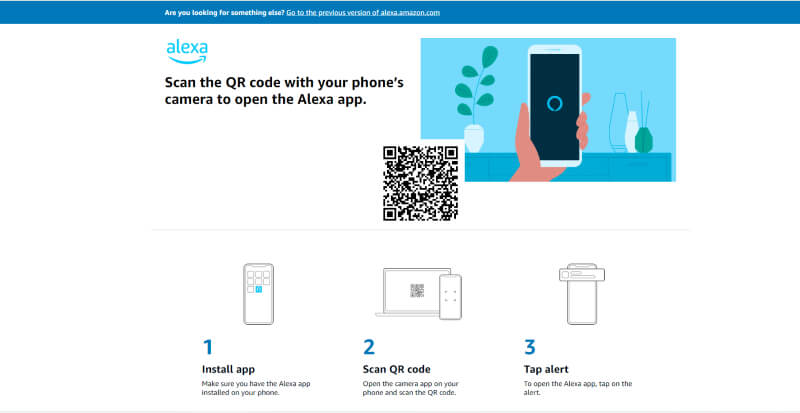
This is an AI-powered digital assistant that can perform a variety of tasks through voice commands. It is designed to interact with users in a natural, conversational way and can provide information on various topics, play music, set reminders, control smart home devices, and even order products from Amazon.
Alexa can also integrate with third-party applications, allowing users to order food, book a ride, or even play games. Its advanced voice recognition capabilities and natural language processing make it a popular choice for many consumers.
Their pricing starts at almost $33.50 in the request and response interaction category. Their streaming conversation charges almost $56 per month and the automated chatbot designer costs at least $150 per month.
Amazon Lex offers a free tier that includes up to 10,000 text requests and 5,000 speech requests per month for the first year. This allows users to get started with the platform and experiment with building chatbots without incurring any costs.
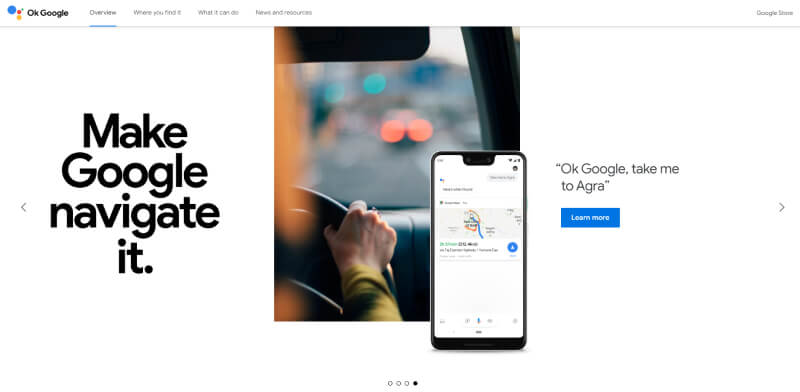
This is another popular digital assistant that is powered by AI and is available on a variety of devices, including smartphones, smart home devices, and even cars. Google Assistant can perform tasks such as setting reminders, sending messages, providing information on various topics, and controlling smart home devices.
It can also integrate with third-party applications, allowing users to order food, book a ride, or even reserve a table at a restaurant. Its advanced machine-learning algorithms and natural language processing make it a powerful tool for businesses and consumers alike.
Certain advanced features may come with additional costs. For example, the price for proactive notifications on the Google platform begins at $0.0025 per notification sent. Nonetheless, the cost may fluctuate depending on the particular feature and amount of usage.
Google Assistant offers a free platform for developers to create chatbots, with no time limit or usage restrictions.

This is a chatbot platform that enables businesses to interact with customers through a variety of channels, including text, voice, and video. It can perform different tasks, including answering customer queries, providing personalized recommendations, and even conducting transactions.
Its advanced AI algorithms allow it to understand customer intent and provide customized solutions based on their preferences. LivePerson also offers a variety of tools for businesses, including analytics and reporting, making it a powerful tool for businesses looking to enhance their customer engagement.
LivePerson offers a subscription-based pricing model, with pricing plans starting at $50/month for basic chatbot features.
LivePerson offers a free trial that allows users to test the platform’s features for 30 days.
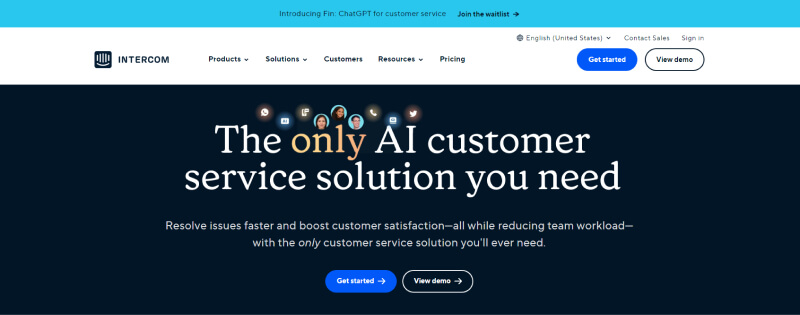
This is another chatbot platform that is designed to enable businesses to communicate with customers in a personalized and targeted way. It can perform a variety of tasks, including answering customer queries, providing product recommendations, and even booking appointments.
Intercom’s advanced machine learning algorithms allow it to understand customer intent and provide customized solutions based on their preferences. Its powerful analytics and reporting tools make it a valuable tool for businesses looking to optimize their customer engagement strategies.
Intercom offers a subscription-based pricing model, with plans starting at $87/month for basic chatbot features.
Intercom offers a free trial that allows users to test the platform’s features for 14 days.
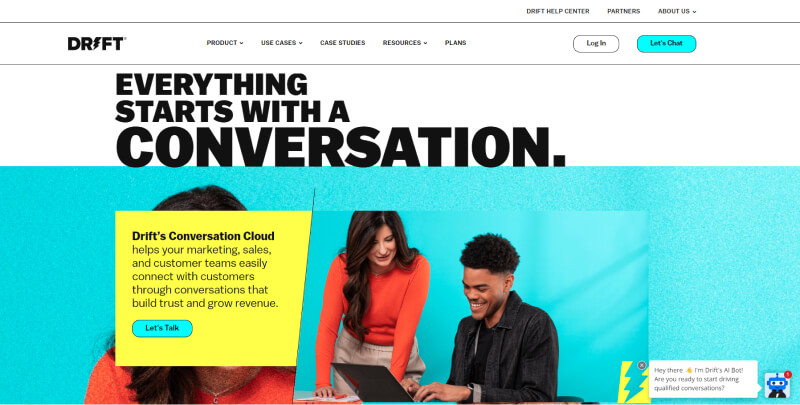
Drift is a conversational marketing platform that uses chatbots to enable businesses to interact with customers in a personalized and targeted way. It can perform several tasks, including answering customer queries, providing product recommendations, and even scheduling meetings.
Drift’s advanced AI algorithms allow it to understand customer intent and provide customized solutions based on their preferences. Its powerful analytics and reporting tools make it a valuable tool for businesses looking to optimize their marketing strategies and enhance customer engagement.
Drift offers a subscription-based pricing model, with plans starting at $50/month for basic chatbot features.
Drift offers a free trial that allows users to test the platform’s features for 14 days.
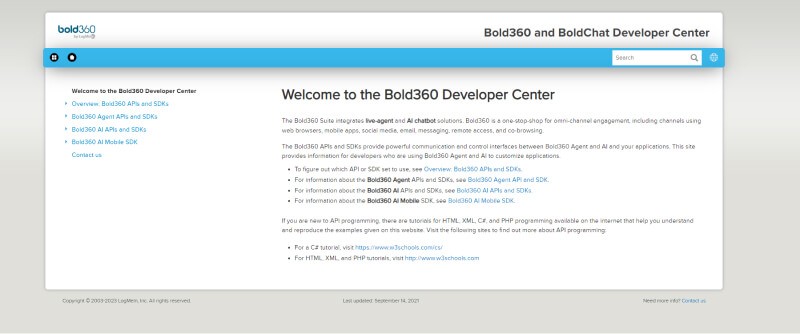
This is a platform that fuels AI to help businesses automatically interact with their customer engagement operations. It can handle a variety of tasks, including answering customer queries, providing product recommendations, and even completing transactions. Bold360’s advanced AI algorithms enable it to understand customer intent and provide customized solutions based on their preferences.
It also integrates with a variety of third-party applications, making it a powerful tool for businesses looking to streamline their customer support operations.
Bold360 offers a subscription-based pricing model, with plans starting at $599/month. The pricing can vary depending on the specific features and usage volume. The more advanced plans can cost several thousand dollars per month or more.
Bold360 offers a 14-day free trial for users to test out their features and functionality.

Ada is an AI-powered chatbot platform that enables businesses to automate their customer support operations. Its functions are answering customer queries, providing personalized recommendations, and even conducting transactions. Ada’s advanced machine learning algorithms enable it to understand customer intent and provide customized solutions based on their preferences.
It also integrates with a variety of third-party applications, making it a powerful tool for businesses looking to optimize their customer support operations.
Ada offers a subscription-based pricing model, with plans starting at $999/month. The pricing can vary depending on the specific features and usage volume. The more advanced plans can cost several thousand dollars per month or more.
Ada offers a free demo of their platform, but it does not include access to all of its features.
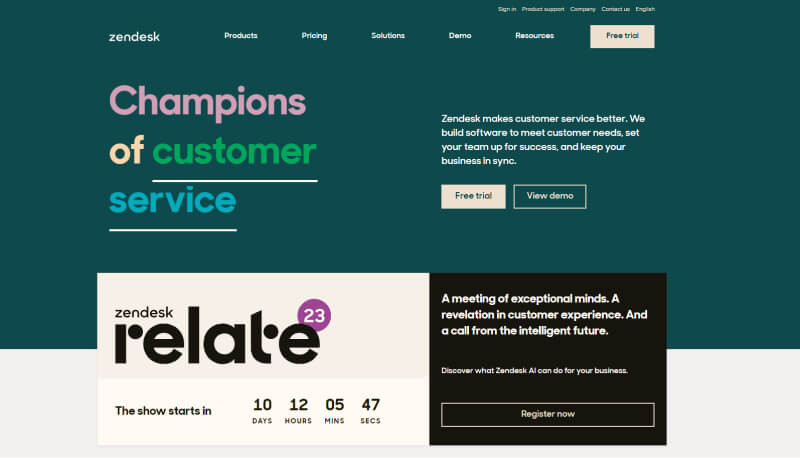
Zendesk Chat is a chatbot platform that enables businesses to communicate with customers in real time. It can handle a variety of tasks, including answering customer queries, providing product recommendations, and even scheduling appointments. Zendesk Chat’s advanced AI algorithms enable it to understand customer intent and provide customized solutions based on their preferences.
It also integrates with a variety of third-party applications, making it a powerful tool for businesses looking to optimize their customer engagement strategies.
Zendesk Chat offers a subscription-based pricing model, with plans starting at $19/month. The pricing can vary depending on the specific features and usage volume. The more advanced plans can cost several hundred dollars per month or more.
Zendesk Chat offers a 14-day free trial for users to test out their features and functionality.
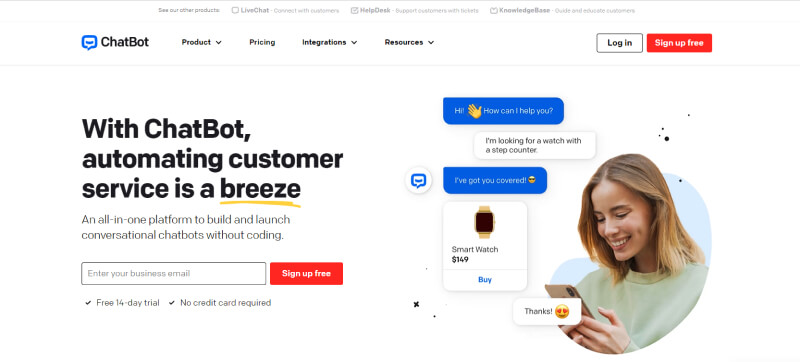
ChatBot.com is an AI-powered chatbot platform that enables businesses to automate their customer support operations. It can handle a variety of tasks, including answering customer queries, providing product recommendations, and even completing transactions. ChatBot.com’s advanced machine learning algorithms enable it to understand customer intent and provide customized solutions based on their preferences.
It also integrates with a variety of third-party applications, making it a powerful tool for businesses looking to streamline their customer support operations.
ChatBot.com offers a subscription-based pricing model, with plans starting at $50/month. The pricing can vary depending on the specific features and usage volume. The more advanced plans can cost several hundred dollars per month or more.
ChatBot.com offers a 14-day free trial for users to test out their features and functionality.
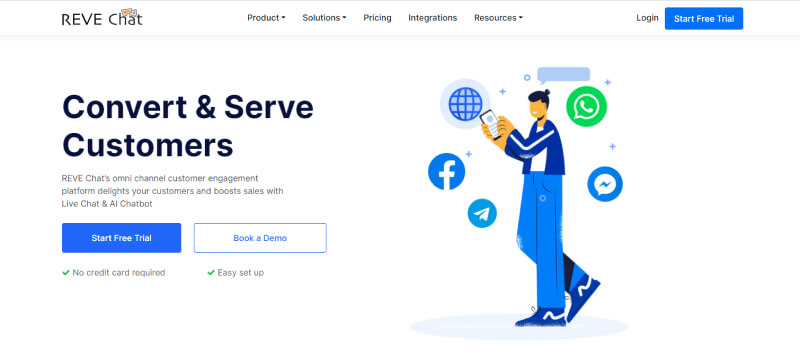
REVE Chat is a chatbot platform that enables businesses to interact with customers in real time. It can handle a variety of tasks, including answering customer queries, providing personalized recommendations, and even conducting transactions. REVE Chat’s advanced AI algorithms enable it to understand customer intent and provide customized solutions based on their preferences.
It also integrates with a variety of third-party applications, making it a powerful tool for businesses looking to optimize their customer engagement strategies. Additionally, it offers features such as co-browsing and video chat, which enhance the customer support experience.
REVE Chat offers a subscription-based pricing model, with plans starting at $39/month. The pricing can vary depending on the specific features and usage volume. The more advanced plans can cost several hundred dollars per month or more.
REVE Chat offers a 14-day free trial for users to test out their features and functionality.
You can expect some key takeaways from these best chatbot examples, as they are becoming increasingly popular tools these days. Advanced machine learning algorithms and natural language processing are the most worthy of them. They go with customer intent and provide customized solutions based on their preferences.
Moreover, chatbots can integrate with a variety of third-party applications, making them powerful tools to enhance customer engagement strategies. The examples discussed above are a convenient resource where you don’t need to rapidly jump to a conclusion or randomly choose out of hunch.